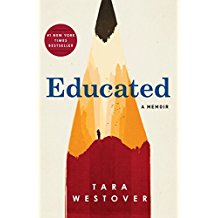Tara Westover’s Astonishing Memoir
 One of you readers suggested this book to me. It is Educated: A Memoir by Tara Westover. Perhaps a number of you have read as it was the NPR Newshour “book of the month” in May, and has been on the New York Times bestseller list.
One of you readers suggested this book to me. It is Educated: A Memoir by Tara Westover. Perhaps a number of you have read as it was the NPR Newshour “book of the month” in May, and has been on the New York Times bestseller list.
I found it to be in the “hard-to-put-down” category. Absorbing. Compelling. And, in some ways, quite disturbing.
Westover is the youngest of seven children raised by Mormon parents in a remote part of southern Idaho. Because her parents believed that the public schools (along with modern medicine and the U.S. government) were doing the devil’s work, she did not set foot in a classroom until age 17.
That happened when this determined young woman got herself into BYU in Salt Lake City. That step began a course of studies that eventually included Harvard and Cambridge (England). She earned a doctorate in History from Cambridge in 2014.
The heart of the story is her family, and Westover’s journey from the isolated enclave of her family into a wider world. She attempts to hold onto both. In that effort — spoiler alert — she does not succeed. Or hasn’t succeeded yet. She is still a young women (born 1986). Her parents are still living.
This means that her memoir is not of the “happy ending” type. Well, her success in the academic world is a sort of happy ending, as is her refusal to let her family define who she is. But there is no resolution/ reconciliation with her family, in particular with her father. He is a man who is domineering, charismatic, sometimes warm and loving, often harsh, and, in some sense of the word, “possessed.” After studying psychology and mental illness, Westover concludes her father suffers from bi-polar illness. Given what she describes, this seems accurate.
A physically abusive elder brother is another key player in the drama, both for his direct impact on young Tara, but also for the way the family closes ranks to deny her account of his abuse and to protect him as well as themselves.
Westover’s father and mother construe everything in life through the lens of their faith, a faith that believes the end-times are at hand. Their Mormonism is, in their view, more genuine than that of other, more mainstream Mormons, people Westover’s father refers to as “Gentiles.”
The Westovers stockpile guns, food, fuel, water and tools to survive the coming apocalypse. They scrape out a living, almost literally, from the father’s junkyard business. When Y2K passes without incident, it is more than a letdown for her father, it is a crisis of faith.
The role of women and conservative/ repressive attitudes towards women are at the heart of their world-view. The abusive brother demeans Tara as a “whore” for no apparent reason other than that she is female and chaffs at the constraints imposed by her family. One could simply call it misogyny, but that seems like attaching a label to something that is far more complex.
Westover makes a point to offer a balanced view of the Mormon church. She explicitly denies that her book is an attack or judgment on that faith. Moreover, she finds support and solace on more than one occasion from Mormon bishops, as well as BYU faculty. Clearly, Mormonism like most churches, is a mix of good and ill.
Why did I find the book disturbing? Well, there is the cover-up of abuse and the identifying of the dissenter as the crazy one — a sad and harrowing story in itself. But even more than that, I found myself stunned by just how alienated these people are from the general American mainstream. While the Westovers seem an extreme case, they are hardly alone. How has this deep alienation and distrust come about?
Earlier this year I discussed Rod Dreher’s book The Benedict Option. Dreher calls for Christians to withdraw from American culture, though his case is far more reasoned than that of Westover’s father and family. But both see American culture as deeply corrosive of their faith and inimical to their values.
That there are a lot of people not on board with contemporary pluralism, secularism and, for want of a better word, “liberalism,” is hardly news. But Westover’s book paints a vivid picture of just how alienated many of our fellow citizens are.
In my last post I mentioned pronouns and efforts to eschew, or provide alternatives to, “he” and “she.” This to support those who understand themselves as “gender non-conforming.” I confess that I haven’t thought this issue through and don’t really know where I stand on it.
However, the day after I wrote that (previous) post, I read a note from the teacher in the first-grade Seattle school classroom of one of our grandchildren. She spoke of discussing with the children the need for pronouns other than “he” and “she.”
I don’t know, though I doubt, that this pronoun education or re-education is part of of sanctioned Seattle school curriculum. I expect it was the teacher’s initiative. But I do know that this is the kind of thing that drives people like the Drehers and Westovers crazy, and sends them off to “home-schooling.”
How do we sort these things out as a society? Do we? Can we? Or do we end up where Tara Westover has, unable to bridge the divide between worlds?
Many questions from a compelling book.
![Anthony B. Robinson [logo]](https://www.anthonybrobinson.com/wp-content/themes/anthonybrobinson/images/logo.png)
![Anthony B. Robinson [logo]](https://www.anthonybrobinson.com/wp-content/themes/anthonybrobinson/images/logo-print.png)